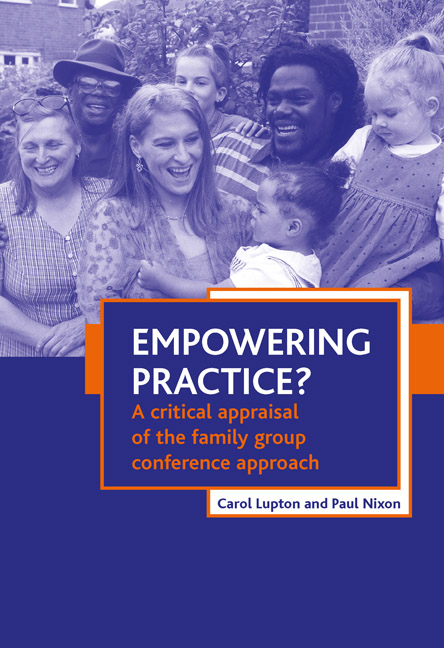Book contents
- Frontmatter
- Contents
- Preface
- Acknowledgements
- Introduction
- one The dilemmas of empowerment
- two Partnership and empowerment in children’s services
- three Lessons from New Zealand
- four Empowering professionals?
- five International perspectives
- six Empowerment in process?
- seven Assessing outcomes in child welfare
- eight Empowering outcomes?
- nine Conclusion
- Bibliography
- Index
two - Partnership and empowerment in children’s services
Published online by Cambridge University Press: 05 July 2022
- Frontmatter
- Contents
- Preface
- Acknowledgements
- Introduction
- one The dilemmas of empowerment
- two Partnership and empowerment in children’s services
- three Lessons from New Zealand
- four Empowering professionals?
- five International perspectives
- six Empowerment in process?
- seven Assessing outcomes in child welfare
- eight Empowering outcomes?
- nine Conclusion
- Bibliography
- Index
Summary
Introduction
“There's no partnership. There's them and there's us, and they’ve got the power.” (quoted in Lewis, 1995, p 29)
Most of the decisions about the care and protection of children take place, most of the time, in their own families. However, in spite (or perhaps because) of this fact, the history of family involvement in such decisions in the context of social services is one of restricted participation. While the concepts ‘partnership’ and ‘empowerment’ have increasingly occupied the language of child welfare social work, they have rarely led to tangible policies/practices that are experienced as ‘empowering’ by the children and families involved. Despite the rhetoric, when things are seen to have gone seriously wrong in families, the remedies are perceived to lie in the hands of the professionals. As late as the 1980s, the National Society for the Prevention of Cruelty to Children (NSPCC) opposed the full participation of children and parents in child protection conferences on the grounds that it would subvert the professionals’ ability to problem solve expediently (Dale et al, 1986) and the Department of Health remained clear in its early draft of inter-agency arrangements for child protection, Working together, that there was no place for parents, let alone children, at child protection conferences (Horne, 1990).
Then the crisis in Cleveland erupted and the Report of the subsequent Inquiry raised concerns about social workers paying too little attention to the views and rights of the parents involved (Secretary of State for Social Services, 1988) and objectifying the roles of ‘abused’, abuser’, ‘abusing family’ and so on. It was felt that, in responding to the concerns about abuse, professionals were in danger of losing sight of the real needs of the children they were trying to help. Children should be seen as people in their own right, not as an “object of concern” (Secretary of State for Social Services, 1988, p 245). While acknowledging the potential tension between the rights of parents and those of their children, the Report emphasised the right of both to be consulted and informed and the importance of recognising family strengths as well as weaknesses.
- Type
- Chapter
- Information
- Empowering Practice?A Critical Appraisal of the Family Group Conference Approach, pp. 31 - 52Publisher: Bristol University PressPrint publication year: 1999



